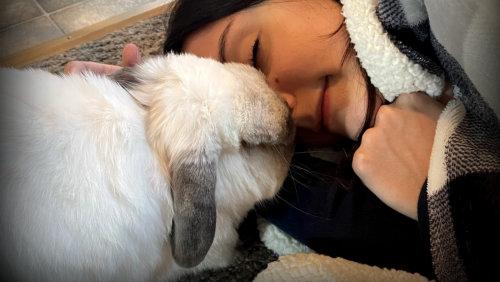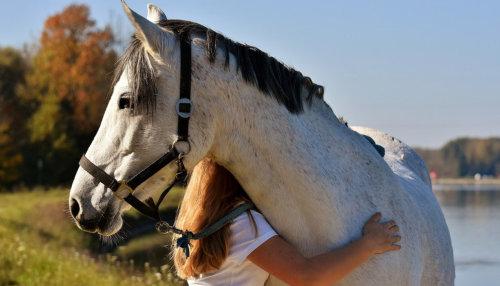If you've been reading my newsletter for awhile, you
may recall that our family pet is a bunny. He is pictured above with our daughter, Amanda.
His name is Buddy. He is 9 years old now and very organized.
Buddy likes to stick to a schedule. In the morning, he makes it known that he's ready to leave his pen and roam our home. He picks up his plastic feeding dish in his teeth and rubs it back and forth on the sides of his pen, making quite a racket each morning.
As soon as my husband heads to his home office in the morning, Buddy eagerly anticipates the five small pieces of an apple he's going to get...his favorite treat in the entire world. He stands up on his hind legs illustrating that he's ready!
At noon, Buddy will be standing in front of our refrigerator waiting for his lunch. He always has a salad.
At night after dinner, Buddy hops up onto our ottoman waiting to be brushed and loved...he's really looking
forward to our daughter coming home from college for the summer, but Joe and I have been sufficient proxies while he's waiting for Amanda.
After watching TV with us for a bit, Buddy knows when it's time for bed. He heads to his pen and waits there until we get his midnight snack ready and we close
up the pen.
Tomorrow, like he has done for years, he'll follow the same routine.
That got me
thinking about other organized animals. Let's explore a few...
Ants
You'll likely agree that ants are perhaps the most well-known, organized animals in the world. They live in colonies of hundreds or
thousands of individuals and work together to gather food, care for their young, and defend their territory.
While they don't have written goals, they know the main goal they're supposed to be focused on...and they work on those goals to completion. Their underground nests are incredibly complex,
with multiple chambers and tunnels.
In some cases, ant colonies can even build structures that stretch for miles underground...determination at its best!
Bees
While I'm not a big fan of bees flying around me, especially when I'm eating outdoors, they are pretty fascinating creatures. Worker bees, drones, and the queen bee, all have their own unique responsibilities.
One of the most amazing things about bees is their ability to build hives. These hives are made up of thousands of individual cells, each of which is used to store honey, pollen, or eggs.
The bees work together,
illustrating incredible teamwork, to create these cells using wax that they produce from their own bodies. Talk about being self-sufficient!
Birds
Birds are another example of organized animals. Many
bird species live in flocks and work together to find food and avoid predators.
One of the most fascinating examples of organized bird behavior is the synchronized flight of flocks of birds, such as geese or starlings. These flocks can form incredible shapes and patterns in the sky as they fly
together.
Also, have you ever seen a bird in the process of building a nest? We have robins in our yard right now busily building theirs...and it's an incredible show.
Being the frugal creatures that they are, they're not out shopping for materials. They use whatever they can find to construct a super-strong 'starter home' for their babies.
Elephants
Elephants are one of the most social and organized mammals on the planet. They live in herds of up to 100 and each individual has a specific role within the group. The oldest female in the herd is typically the leader and she helps to guide the group to food and water sources as well as protecting the group from
predators. (You go, girl!)
When a young elephant is threatened, the entire herd will circle around the calf, using their massive bodies to form a protective barrier. The matriarch will often take charge in these situations, directing the other elephants to position themselves in the most
effective way. I love the leadership aspect of this!
In addition to their social organization, elephants also have a remarkable memory and are able to recall the location of water sources and other important resources for many years. This allows them to travel long distances in search of food and
water and to return to places that they have visited in the past.
So next time you see an ant, bee, bird, elephant, bunny, or any other creature, take a moment to notice and appreciate the incredible organizational skills they have!
P.S. Reply and tell me an organized trait your pet (or another animal you know) has. I'll publish your response in a future edition of this ezine!?












